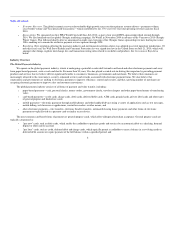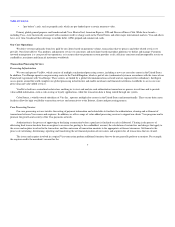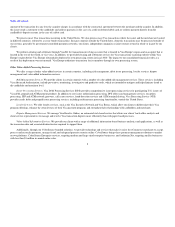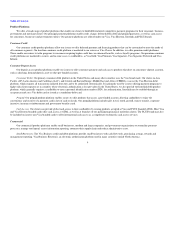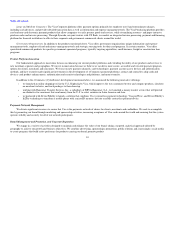Visa 2010 Annual Report Download - page 17
Download and view the complete annual report
Please find page 17 of the 2010 Visa annual report below. You can navigate through the pages in the report by either clicking on the pages listed below, or by using the keyword search tool below to find specific information within the annual report.
Table of Contents
Governments in certain countries have acted, or could act, to provide resources or protection to selected national payment card providers or national
payment processing providers to support domestic competitors, to displace us from, or prevent us from entering into, or substantially restrict us from
participating in, particular geographies. For example, our financial institution clients in China may not issue cards carrying our brands for domestic use in
China. Governments in certain other countries have considered similar restrictions from time to time.
Financial Industry Regulation. The U.S. Federal Financial Institution Examination Council periodically reviews certain of our operations in the United
States to ensure our compliance with applicable data integrity and security requirements, as well as other requirements applicable to us because of our role as
a service provider to financial institutions. In recent years, the federal banking regulators in the United States have adopted a series of regulatory measures
intended to require more conservative accounting, greater risk management and higher capital requirements for bank credit card activities, particularly in the
case of banks that focus on subprime cardholders.
In the United States, regulators and the U.S. Congress have increased their scrutiny of our clients' pricing and underwriting standards relating to credit.
For example, a number of regulations have been issued to implement the U.S. Fair and Accurate Credit Transactions Act. One such regulation pertaining to
risk-based pricing could have a significant impact on the application process for credit cards and result in increased costs of issuance and/or a decrease in the
flexibility of card issuers to set the price of credit.
The U.S. Wall Street Reform and Consumer Protection Act created a new independent Consumer Financial Protection Bureau within the Federal
Reserve System. The bureau will assume responsibility for most federal consumer protection laws in the area of financial services and will have new
authorities with respect to consumer issues, including those pertaining to us to some extent. The creation of the bureau and its actions may make payment card
transactions less attractive to card issuers.
Government regulators may determine that we are a systemically important payments system and impose settlement risk management requirements on
us, including new settlement procedures or other operational rules to address credit and operational risks or new criteria for client participation and merchant
access to our payments system. In addition, outside of the United States, a number of jurisdictions have implemented legal frameworks to regulate their
domestic payments systems. For example, regulators in Australia, Mexico, Colombia, India, Singapore and Malaysia have received statutory authority to
regulate certain aspects of the payments systems in those countries.
Regulation of Internet Transactions. Many jurisdictions in which our clients and we operate are considering, or are expected to consider, legislation
with regard to Internet transactions, and in particular with regard to choice of law, the legality of certain eCommerce transactions, the collection of applicable
taxes and copyright and trademark infringement. In October 2006, the U.S. Congress enacted legislation requiring the coding and blocking of payments for
certain types of Internet gambling transactions. The legislation applies to payment system participants, including Visa and our U.S. clients, and compliance
was required by June 1, 2010. These federal rules require us and our clients to implement compliance programs that could increase our costs, decrease our
transaction volumes or both.
In addition, the U.S. Congress continues its consideration of regulatory initiatives in the areas of Internet prescription drug purchases, copyright and
trademark infringement, and privacy, among others, that could impose additional compliance burdens on us and/or our clients. Some U.S. states are
considering a variety of similar legislation. If implemented, these initiatives could require us or our clients to monitor, filter, restrict, or otherwise oversee
various categories of payment card transactions, thereby increasing our costs or decreasing our transaction volumes.
16


